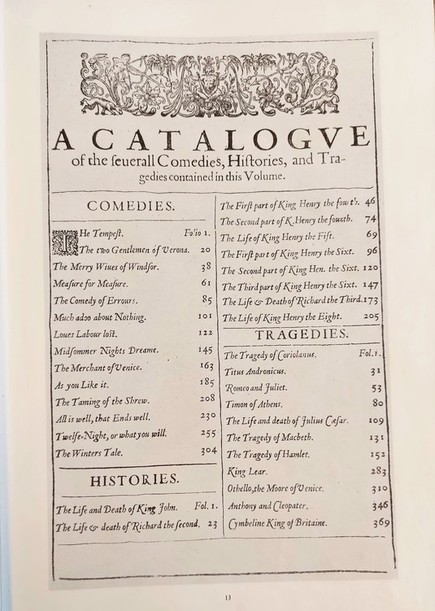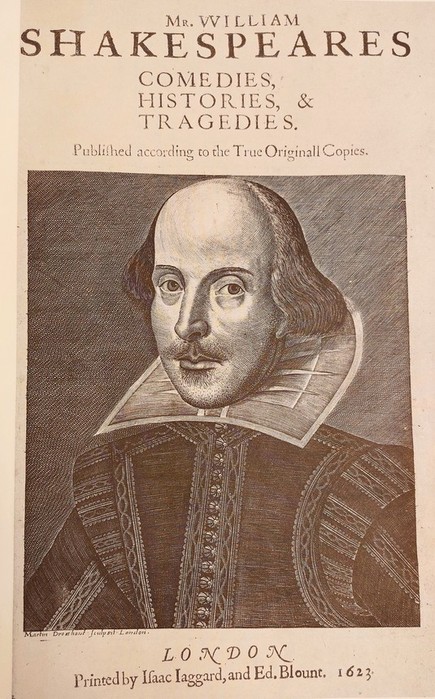The First Folio of Shakespeare
The First Folio of Shakespeare
The LMU’s Shakespeare Research Library holds a copy of the 1623 First Folio of Shakespeare in a Norton Facsimile edition. This facsimile edition was produced by using the complete First Folio collection of the Folger Shakespeare Library in Washington, DC, which currently owns a total of eighty-two Folio copies that all vary slightly in structure, condition, and appearance. The First Folio edition of Shakespeare’s dramatic works is now one of the most famous printed works in existence. It was produced by Isaac Jaggard and published by Ed Blount. The selection of plays contained in the Folio was made by John Heminges and Hendry Condell who were actors and share-holders with The King’s Men, the acting company with which Shakespeare worked for most of his career.
The First Folio contains thirty-six of Shakespeare’s plays. Without it, a substantial part of Shakespeare’s dramatic oeuvre would not be known to us today. The Tempest, Macbeth, As You Like It, The Winter’s Tale, and Antony and Cleopatra are just a few of the plays that would be lost if it were not for the Folio text. In addition, the Folio contains a number of plays that were printed before 1623 in a quarto format, but the text versions printed in the Folio edition differ from the quarto prints. Sometimes, lines or scenes were altered, added to, or completely omitted in the Folio texts. Plays with a print history prior to the Folio include Titus Andronicus, Romeo and Juliet, and A Midsummer Night’s Dream.
The Folio’s prefatory material and paratexts are as fascinating to consider as the plays themselves: The Folio’s “Catalogue”, for example, orders the plays by genre, rather than chronology and divides the plays into tragedies, comedies, and histories. This categorisation was undertaken by Heminges and Condell and is a key element that guides readers through Shakespeare’s works to this day. Generations of critics and researchers have followed these genre classifications put forward here by Heminges and Condell. As the editing process was ongoing while the Folio was already being printed, Troilus and Cressida is curiously missing from the “Catalogue”.

The title page insists on the authenticity and originality of the textual edition provided here, stating that the Folio contains “Mr. William Shakespeare’s Comedies, Histories, & Tragedies. Published according to the True Originall Copies.” The Folio also includes a list of “Principall Actors”, which repeats the claim to authenticity. The plays are “truly set forth according to their First Originall”.
The Folio’s title page contains an engraving by Martin Droeshout which shows the portrait of Shakespeare. The Droeshout engraving is now believed to be an authentic depiction of Shakespeare as it was approved by Blount, Jaggard, Condell, and Heminges. It is one of only two depictions of Shakespeare that we might consider authentic and a definitive depiction of the playwright. Ben Jonson’s short poem “To the Reader” commends the engraving as a good likeness of Shakespeare, but points out that readers will have to turn to the texts of the Folio edition to encounter Shakespeare’s wit and mastery of his craft.

Further memorial poetry by Ben Jonson, Hugh Holland, Leonard Digges, and I.M. (possibly James Mabbe) celebrates the dramatic works of Shakespeare and their compilation in the Folio edition. Indeed, the material contributes significantly to our modern idea of Shakespeare as a gifted writer. Jonson’s memorial poem to Shakespeare famously declares that the bard was “not of an age, but for all time” while Digges’s verses proclaim the lasting impact of Shakespeare’s works:
Shakespeare, at length thy pious fellowes give
The world thy Workes: thy Workes, by which, out-live
Thy Tombe, thy name must when that stone is rent,
And time dissolves thy Stratford Moniment,
Here we alive shall view thee still. This Booke,
when Brasse and Marble fade, shall make thee looke
fresh to all ages […]
Even though the Folio does not always contain the most extensive version of a play, it is of immense value as it helped to preserve eighteen plays that would not be known to us otherwise. In addition, and perhaps more importantly, the Folio is a key text that contributed to the making of the modern idea of Shakespeare as writer of exceptional talent and genius who shaped and influenced literary and dramatic standards and expectations for generations to come.
Lara Ehrenfried

